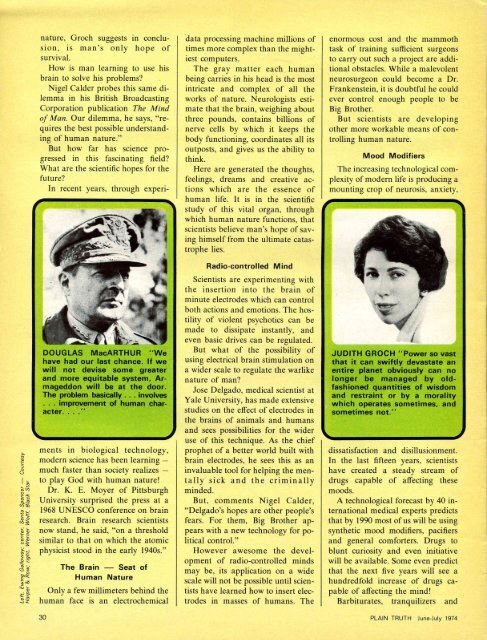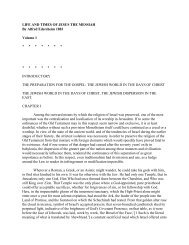You also want an ePaper? Increase the reach of your titles
YUMPU automatically turns print PDFs into web optimized ePapers that Google loves.
nature, Groch suggests in conclusion,<br />
is man' s only hope of<br />
survival.<br />
How is man learning to use his<br />
brain to solve his problems?<br />
Nigel Calder probes this same dilemma<br />
in his British Broadcasting<br />
Corporation publication The Mind<br />
of Man. Our dilemma, he says, "requires<br />
the best possible understanding<br />
of human nature."<br />
But how far has science progressed<br />
in this fascinating field?<br />
What are the scientific hopes for the<br />
future?<br />
In recent years, through experi-<br />
DOUGLAS MacARTHUR "We<br />
have had our last chance. If we<br />
will not devise some greater<br />
and more equitable system. Armageddon<br />
will be at the door.<br />
The problem basically . . . involves<br />
. . . improvement of human character<br />
. .. . "<br />
men ts in biological technology,<br />
modem science has been learning -<br />
much faster than society realizes -<br />
to play God with human nature!<br />
Dr. K. E. Moyer of Pittsburgh<br />
University surprised the press at a<br />
1968 UNESCO conference on brain<br />
research. Brain research scientists<br />
now stand, he said, "on a threshold<br />
similar to that on which the atomic<br />
physicist stood· in the early 1940s."<br />
The Brain - Seat of<br />
Human Nature<br />
Only a few millimeters behind the<br />
human face is an electrochemical<br />
30<br />
'data processing machine millions of<br />
times more <strong>com</strong>plex than the mightiest<br />
<strong>com</strong>puters.<br />
The gray matter each human<br />
being carries in his head is the most<br />
intricate and <strong>com</strong>plex of all the<br />
works of nature. Neurologists estimate<br />
that the brain, weighing about<br />
three pounds, contains billions of<br />
nerve cells by which it keeps the<br />
body functioning, coordinates all its<br />
outposts, and gives us the ability to<br />
think.<br />
Here are generated the thoughts,<br />
feelings, dreams and creative actions<br />
which are the essence of<br />
human life. It is in the scientific<br />
study of this vital organ, through<br />
which human nature functions, that<br />
scientists believe man's hope of saving<br />
himself from the ultimate catastrophe<br />
lies.<br />
Radio-controlled Mind<br />
Scientists are experimenting with<br />
the insertion into the brain of<br />
minute electrodes which can control<br />
both actions and emotions. The hostility<br />
of violent psychotics can be<br />
made to dissipate instantly, and<br />
even basic drives can be regulated.<br />
But what of the possibility of<br />
using electrical brain stimulation on<br />
a wider scale to regulate the warlike<br />
nature of man?<br />
Jose Delgado, medical scientist at<br />
Yale University, has made extensive<br />
studies on the effect of electrodes in<br />
the brains of animals and humans<br />
and sees possibilities for the wider<br />
use of this technique. As the chief<br />
prophet of a better world built with<br />
brain electrodes, he sees this as an<br />
invaluable tool for helping the mentally<br />
sick and the criminally<br />
minded.<br />
But, <strong>com</strong>ments Nigel Calder,<br />
"Delgado's hopes are other people's<br />
fears. For them, Big Brother appears<br />
with a new technology for political<br />
control."<br />
However awesome the development<br />
of radio-controlled minds<br />
may be, its application on. a wide<br />
scale will not be possible until scientists<br />
have learned how to insert electrodes<br />
in masses of humans. The<br />
enormous cost and the mammoth<br />
task of training sufficient surgeons<br />
to carry out such a project are additional<br />
obstacles. While a malevolent<br />
neurosurgeon could be<strong>com</strong>e a Dr.<br />
Frankenstein, it is doubtful he could<br />
ever control enough people to be<br />
Big Brother.<br />
But scientists are developing<br />
other more workable means of controlling<br />
human nature.<br />
Mood Modifiers<br />
The increasing technological <strong>com</strong>plexity<br />
of modern life is producing a<br />
mounting crop of neurosis, anxiety,<br />
JUDITH GROCH "Power so vast<br />
that it can swiftly devastate an<br />
entire planet obviously can no<br />
longer be managed by oldfashioned<br />
quantities of wisdom<br />
and restraint or by a morality<br />
which operates sometimes. and<br />
sometimes not."<br />
dissatisfaction and disillusionment.<br />
In the last fifteen years, scientists<br />
have created a steady stream of<br />
drugs capable of affecting these<br />
moods.<br />
A technological forecast by 40 international<br />
medical experts predicts<br />
that by 1990 most of us will be using<br />
synthetic mood modifiers, pacifiers<br />
and general <strong>com</strong>forters. Drugs to<br />
blunt curiosity and even initiative<br />
will be available. Some even predict<br />
that the next five years will see a<br />
hundredfold increase of drugs capable<br />
of affecting the mind!<br />
Barbiturates, tranquilizers and<br />
PLAIN TRUTH June-July 1974












